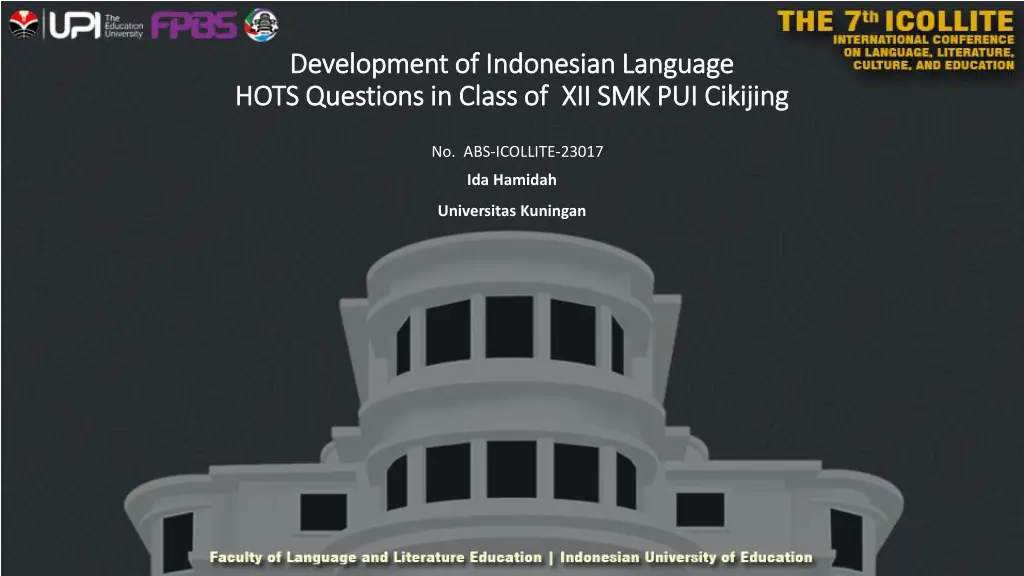
Developing Higher Order Thinking Skills (HOTS) Questions in Indonesian Language Class XII SMK PUI Cikijing
Explore the development of Higher Order Thinking Skills (HOTS) questions in Indonesian Language for Class XII SMK PUI Cikijing, focusing on critical thinking, creative thinking, and problem-solving skills. Discover the importance of HOTS questions in preparing students for the challenges of the 21st century through a research and development approach.
Uploaded on | 2 Views
Download Presentation

Please find below an Image/Link to download the presentation.
The content on the website is provided AS IS for your information and personal use only. It may not be sold, licensed, or shared on other websites without obtaining consent from the author. If you encounter any issues during the download, it is possible that the publisher has removed the file from their server.
You are allowed to download the files provided on this website for personal or commercial use, subject to the condition that they are used lawfully. All files are the property of their respective owners.
The content on the website is provided AS IS for your information and personal use only. It may not be sold, licensed, or shared on other websites without obtaining consent from the author.
E N D
Presentation Transcript
Development of Indonesian Language Development of Indonesian Language HOTS Questions in Class of HOTS Questions in Class of XII SMK PUI XII SMK PUI Cikijing Cikijing No. ABS-ICOLLITE-23017 Ida Hamidah Universitas Kuningan
INTRODUCTION - The 21st century learning requires learners to have 3 important abilities: critical thinking, creative thinking, and problem solving. - In order for students to have 21st century skills, teachers are required to have ability and skills to manage teaching components. One of the ability that must be possessed is learning evaluation. - Based on the results of observations and interviews with Indonesian language teachers class 12 SMK PUI Cikijing, the data obtained shows that the questions used are still not yet HOTS. According to Astutik in Hasnah, et al (2021) Providing HOTS type questions has a role, including HOTS type questions have roles including preparing competent students to welcome the 21st century and increase student learning motivation. Research Question 1. What is the profile of HOTS questions (Higher Order Thinking Skills) Indonesian language class XII SMK PUI Cikijing? 2. How is the design of HOTS questions (Higher Order Thinking Skills) Indonesian language in class XII SMK PUI Cikijing? 3. How is the development of PAS questions Indonesian Language Grade XII SMK PUI Cikijing? This study aims to develop HOTS questions for Indonesian Language Class XII SMK PUI Cikijing based on four HOTS criteria, namely aspects of Operational Verbs, critical thinking skills, creative thinking, and problem solving.
LITERATURE REVIEW Grondlund and Linn, explain the evaluation of learning is the process of collecting, analysing, and interpreting information in a systematically to Determine the achievement of learning objectives. The purpose of evaluation Evaluation learning is now orientated towards development of learners' potential such as the ability to think critically, think creative thinking and problem- solving skills. These three abilities are known as known as higher order thinking skills or HOTS (Higher Order Thinking Skill). Higher order thinking skills or HOTS (Higher Order Thinking Skill) is an ability that can prepare students to be able to face the challenges of life and academic challenges in the future. HOTS implements learning that prioritises the development of attitudes, ideas and skills. learning is to gather information that is used as a basis for determine the level of progress, development, and learning achievement students, as well as the effectiveness of teacher teaching (Ratnawulan & Rusdiana, 2015).
METHOD The Research methods in this study Research and Development (R&D). Research method R&D is a method used to produce certain products, and test the effectiveness of the product. The 4D development model in this research is only limited to design. Therefore, the development stage begins by doing (1) Define, (2) Design, (3). Definition. Data collection techniques in this This research uses documentation. The documentation used in this research is a document of ansewered Indonesia class XII SMK PUI Cikijing.
FINDING AND DISCUSSION Based on the results of the analysis of PAS questions Indonesian class XII SMK PUI Cikijing which is reviewed from four criteria including aspects of Operational Verbs (KKO), critical thinking skills, creative thinking, and problem solving. The results show that of the 30 items questions that are reviewed from the aspect of Operational Verbs (KKO) are still many in the LOTS category including C1 (remembering) and C2 (understanding), the aspect of Operational Verbs (KKO) aspects that including HOTS by 36% (11 out of 30 questions), from the aspect of critical thinking ability by 36% (11 out of 30 questions), from the aspect of creative thinking skills by 23% (7 out of 30 questions), and from the aspect of problem solving by 6% (2 out of 30 questions). problem solving aspect by 6% (2 out of 30 questions). Based on these results, it shows that the PAS questions used in SMK PUI Cikijing applies the most criteria and critical thinking of all Indonesian PAS questions. However, on problem solving criteria is still very less because there are only 2 questions that support problem solving.
Indonesian Language HOTS Problem Design In the design of HOTS questions, the questions used are questions used are PAS questions for Class XII SMK PUI Cikijing odd semester of the 2022/2023 school year. 2022/2023 which totalled 30 questions. Then, these questions were developed based on HOTS criteria criteria in terms of Operational Verbs, critical thinking, creative thinking, and problem solving. creative thinking, and problem solving. According to Anderson and Karthwohl (2001) levels one to three are the abilities of levels one to three are thinking skills or LOTS (Lower Order Thinking Skill) and at levels four to six are HOTS (Higher Order Thinking Skill). So what is reviewed from the cognitive domain of HOTS thinking ability consists of C4 (analyse), C5 (evaluate), and C6 (create). (evaluate), and C6 (create). Apart from being reviewed from the KKO aspect, HOTS questions can be reviewed from the HOTS questions can be viewed from the criteria of critical thinking critical thinking, creative thinking, and problem solving Sani (2019). Facione (2010) in Agnafia, D. N. (2019) categorises critical thinking skills into into six criteria, namely interpretation, analysis, inference, evaluation, explanation, and self-regulation. Ability creative thinking ability according to Torrance (1970) in Sani (2019) consists of four criteria, namely fluency, flexibility, originality, and elaboration. (originality, and elaboration. Problem solving ability according to Bransford and Stein (1984) in Sani (2019) consist of five steps, namely (2019) consists of five steps, namely identify the problem, define and state the problem, xplore possible strategies, implement the strategy, Agnafia, D. N. (2019) categorised critical thinking skills into into six criteria, namely interpretation, analysis, inference, evaluation, explanation, and self- regulation. Ability creative thinking ability according to Torrance (1970) in Sani (2019) consists of four criteria, namely fluency, flexibility, originality, and elaboration. (originality, and elaboration. Problem solving ability according to Bransford and Stein (1984) in Sani (2019) consist of five steps, namely (2019) consists of five steps, namely identify the problem, define and state the problem, explore possible strategies, implement the strategy, and look back and evaluate the consequences of the aactivities undertaken.
Development of HOTS Questions for Indonesian Language In the development of HOTS questions, questions were developed based on the results of analysis of the profile of HOTS questions in Indonesian Indonesia Class XII SMK PUI Cikijing which is viewed from the aspect of Operational VerbsOperational Verbs (KKO), critical thinking, creative thinking, and problem solving.
CONCLUSION Based on the results of the research and discussion that has been described in the previous, it is concluded that the application of HOTS criteria in PAS questions Indonesian language class XII questions used by SMK PUI Cikijing is still used by SMK PUI Cikijing is still lacking in its application. This can be seen from 30 items that are reviewed from Operational Verb (KKO) aspect there are still many in the LOTS category including C1 (remembering) and C2 (understanding), the Operational Verbs (OWV) that include HOTS by 36% (11 out of 30 questions), from the aspect of critical thinking skills by 36% (11 out of 30 questions), from the aspect of creative thinking by 23% (7 out of 30 questions), and from the aspect of problem solving by 6% (2 out of 30 questions). By Overall, PAS questions at SMK PUI Cikijing that fulfil the four criteria HOTS is 6% or 2 items. Furthermore, those included in 2-3 criteria amounted to 30% or 9 items and the rest are included in 1 criterion criteria by 63% or 19 items. Based on the results of the analysis carried out at the define stage, PAS questions at SMK PUI Cikijing is still lacking in fulfilling the criteria for HOTS questions and many are still included in LOTS questions. So a design in the form of a table was made to develop LOTS questions into HOTS based on HOTS criteria in terms of Operational Verbs (KKO), critical thinking criteria, creative thinking, and HOTS criteria. The development was carried out by creating HOTS questions for Indonesian Language Indonesia Class XII which previously LOTS category into HOTS based on HOTS criteria. HOTS based on HOTS criteria criteria in terms of Operational Verbs Operational Verbs (KKO) including cognitive domain C4 (analyse) and C5 (evaluate), critical thinking criteria, creative thinking, and problem solving (KKO), critical thinking skills, creative thinking, and problem solving.
THANK YOU! Follow us @...






















